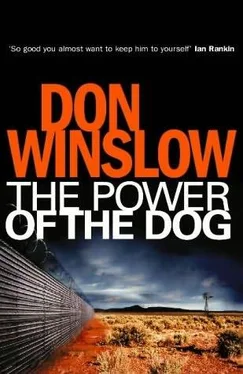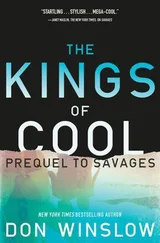Don Winslow - The Power of the Dog
Здесь есть возможность читать онлайн «Don Winslow - The Power of the Dog» весь текст электронной книги совершенно бесплатно (целиком полную версию без сокращений). В некоторых случаях можно слушать аудио, скачать через торрент в формате fb2 и присутствует краткое содержание. Жанр: Триллер, на английском языке. Описание произведения, (предисловие) а так же отзывы посетителей доступны на портале библиотеки ЛибКат.
- Название:The Power of the Dog
- Автор:
- Жанр:
- Год:неизвестен
- ISBN:нет данных
- Рейтинг книги:3 / 5. Голосов: 1
-
Избранное:Добавить в избранное
- Отзывы:
-
Ваша оценка:
- 60
- 1
- 2
- 3
- 4
- 5
The Power of the Dog: краткое содержание, описание и аннотация
Предлагаем к чтению аннотацию, описание, краткое содержание или предисловие (зависит от того, что написал сам автор книги «The Power of the Dog»). Если вы не нашли необходимую информацию о книге — напишите в комментариях, мы постараемся отыскать её.
The Power of the Dog — читать онлайн бесплатно полную книгу (весь текст) целиком
Ниже представлен текст книги, разбитый по страницам. Система сохранения места последней прочитанной страницы, позволяет с удобством читать онлайн бесплатно книгу «The Power of the Dog», без необходимости каждый раз заново искать на чём Вы остановились. Поставьте закладку, и сможете в любой момент перейти на страницу, на которой закончили чтение.
Интервал:
Закладка:
There are Americans everywhere, drinking beer at the bar, sipping Cokes in the coffee shop, and most of them are military advisers. They’re in civvies, but the military look is unmistakable-the short sidewall haircuts, the short-sleeved polo shirts, the jeans over tennis shoes or highly polished brown army-issue.
Ever since the Sandinistas took over Nicaragua, just to the south, El Salvador has become an American military ghetto. Ostensibly, the Americans are there to advise the Salvadoran army in their war against the FLMN guerrillas, but they’re also there to make sure that El Salvador doesn’t become the next domino to topple in Central America. So you have American soldiers advising the Salvadorans and American soldiers advising the Contras, and then you have the spooks.
The Company types are as obvious in their own way as the off-duty soldiers are in theirs. They dress better, for one thing-they wear tailored suits with open shirts and no ties instead of sports clothes that came off the rack at the base commissary. Their haircuts are stylish-even a little long, in the current Latin American fashion-and their shoes are expensive Churchills and Bancrofts. If you see a spook wearing tennis shoes, Art thinks, he’s playing tennis.
So there are the soldiers and the spooks and then there are the embassy types-who might be neither, either or both. There are the actual diplomats and the consular officials who deal with the daily, mundane issues of visas and lost passports and American retro-hippie kids arrested for vagrancy and/or drug use. Then there are the cultural attaches, and the secretaries and the typists; and then there are the military attaches, who look just like the military advisers except that they dress better; and then there are the embassy employees, who wear fictional job descriptions as transparent veils of decency, and who are really spooks. They sit in the embassy and monitor radio broadcasts out of Managua, their ears keenly pitched for the sound of a Cuban accent or, better yet, Russian. Or they work “the street,” as they say, meeting their sources in exactly such places as the Sheraton bar, trying to suss out which colonel is on the way up, which is on the way out, which might be planning the next golpe-coup-and whether this would be a good thing or a bad thing.
So you have your soldiers, your spooks, your embassy types and your embassy spooks, and then you have your businessmen.
Coffee buyers, cotton buyers, sugar buyers.
The coffee buyers look like they belong. They should, Art thinks. Their families have been down here for generations. They have the easy air of ownership of the place-this is their bar, theirs and the Salvadoran growers with whom they’re having lunch on the broad patio. The cotton and sugar buyers look more classically American corporate-these are more recent crops on the Salvadoran landscape-and the American buyers have yet to blend in. They look uncomfortable, incomplete without ties.
So you have a lot of Americans, and you have a lot of wealthy Salvadorans, and the only other Salvadorans you see are either hotel workers or secret police.
Secret police, Art thinks. Now there’s an oxymoron. The only thing secret about the secret police is how they manage to stand out so much. Art stands in the lobby and picks them out like bulbs on a Christmas tree. It’s simple-their cheap suits are bad imitations of the expensive tailored look of the upper class. And while they try to look like businessmen, they still have the brown, weathered faces of campesinos. No ladino from the Forty Families is going to enroll in the ranks of the police, secret or otherwise, so these guys assigned to monitor the comings and goings at the Sheraton still look like farmers attending a city cousin’s wedding.
But, Art knows, the role of the secret police in a society like this isn’t to blend in but to be seen. To be noticed. To let everyone know that Big Brother is watching.
And taking notes.
Ramos finds the cop he’s looking for. They repair to a room and start the negotiations. An hour later he and Art are on their way to the compound where Tio is holed up with his Lolita.
The drive out of San Salvador is long, frightening and sad. El Salvador has the highest population density in Central America, growing every day, and Art sees the evidence everywhere. Little shanty villages seem to occupy every wide spot in the road-jerry-rigged stalls made of cardboard, corrugated tin, plywood, or just plain chopped brush offer everything for sale to people who have little or nothing with which to buy. Their owners rush the jeep when they see the gringo in the front seat. The kids push up against the jeep, asking for food, money, anything.
Art keeps driving.
He has to get to the compound before Tio disappears again.
People disappear in El Salvador all the time.
Sometimes at the rate of a couple hundred a week. Snatched by right-wing death squads, and then they’re just gone. And if anyone asks too many questions about it, he disappears, too.
All Third World slums are the same, Art thinks-the same mud or dust, depending on the climate and the season, the same smells of charcoal stoves and open sewers, the same heartbreakingly monotonous scenery of malnourished kids with distended bellies and big eyes.
It’s sure as hell not Guadalajara, where a large and generally prosperous middle class softens the slope between rich and poor. Not in San Salvador, he thinks, where the shanty slums press against gleaming high-rises like the thatched huts of medieval peasants pressed against castle walls. Except these castle walls are patrolled by private security guards wielding automatic rifles and machine pistols. And at night, the guards venture out from the castle walls and ride through the villages-in jeeps instead of on horseback-and slaughter the peasants, leaving their bodies at crossroads and in the middle of village squares, and rape and kill women and execute children in front of their parents.
So the survivors will know their place.
It’s a killing ground, Art thinks.
El Salvador.
The Savior, my ass.
The compound sits in a grove of palm trees a hundred yards from the beach.
A stone wall topped by barbed wire surrounds the main house, the garage and the servants’ quarters. A thick wooden gate and a guard shack block the driveway from the private road.
Art and Ramos crouch behind the wall thirty yards from the gate.
Hiding from the full moon.
A dozen Salvadoran commandos are posted at intervals around the wall’s perimeter.
It’s taken frantic hours of negotiation to procure Salvadoran cooperation, but now the deal is in place: They can go in and get Barrera, whisk him to the U.S. Embassy, fly him out on a State Department jet to New Orleans and charge him there with first-degree murder and conspiracy to distribute narcotics.
A cowed real-estate agent has been hauled out of bed and taken to his office, where he gives the commando team a diagram of the compound. The shaken man is being held incommunicado until the raid is over. Art and Ramos pore over the diagram and come up with an operational plan. But it all has to be done quickly, before Barrera’s protectors in the Mexican government can get wind of it and interfere; and it has to be done cleanly-no fuss, no muss and above all no Salvadoran casualties.
Art checks his watch-4:57 a.m.
Three minutes until H hour.
A breeze wafts the scent of jacaranda from the compound, reminding Art of Guadalajara. He can see the tops of the trees over the wall, their purple leaves shimmering silver in the bright moonlight. On the other side, he hears the waves lap softly on the beach.
A perfect lovers’ idyll, he thinks.
A perfumed garden.
Paradise.
Well, let’s hope Paradise is about to be lost for good this time, he thinks. Let’s hope Tio is sleeping soundly, sexually drugged into a postcoital stupor from which he can be rudely awakened. Art has an admittedly vulgar image of Tio being dragged bare-assed into the waiting van. The more humiliation the better.
Читать дальшеИнтервал:
Закладка:
Похожие книги на «The Power of the Dog»
Представляем Вашему вниманию похожие книги на «The Power of the Dog» списком для выбора. Мы отобрали схожую по названию и смыслу литературу в надежде предоставить читателям больше вариантов отыскать новые, интересные, ещё непрочитанные произведения.
Обсуждение, отзывы о книге «The Power of the Dog» и просто собственные мнения читателей. Оставьте ваши комментарии, напишите, что Вы думаете о произведении, его смысле или главных героях. Укажите что конкретно понравилось, а что нет, и почему Вы так считаете.












